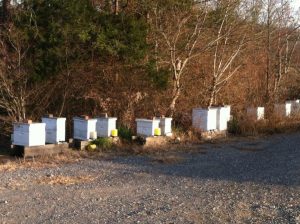
By Julia Lancaster
There’s a new buzz going around Virginia.
Beginning in January, Virginia beekeepers may apply for a $200 grant from the Beehive Grant Fund for each hive they maintain.
The Beehive Grant Fund is a state initiative to encourage beekeeping. It was created and funded by a bill signed into law this year. The Virginia Department of Agriculture and Consumer Services will administer the fund.
The number of hives in Virginia has dropped from 100,000 in the 1970s to 35,000 today. Such a decline worries agricultural officials, since honeybees provide a valuable service to communities by pollinating gardens and helping increase yields of fruits and vegetables.
“Beehives all over Virginia are in major danger, but not one specific cause has been pinpointed,” said Emily Scott, an environmentalist at Lexington’s Boxerwood Gardens, which specializes in a program that educates local elementary students about the importance of beekeeping.
Many people from the general and scientific press claim the honeybee population is suffering from Colony Collapse Disorder, although causes of CCD have not been identified.
Mike Wolfe, the founder and current vice president of the Botetourt chapter of the Virginia State Beekeepers Association, emphasizes the importance of sustainable small-scale apiculture.
“Commercial pollination takes its toll,” he said. “A colony traveling back and forth across North America is exposed to pesticides on many different blossoms.”
In the industrial-scale systems of crop production, a huge number of honeybees are also needed in a very limited window of time, sometimes as short as a few days.
In comparison, Wolfe says, backyard colonies are not stressed. “This keeps the bees’ immune systems at higher levels. Backyard colonies are also spread out from each other across the state, limiting the spread of diseases.”
Whatever the reason, the drastic decrease of the honeybee population is undeniable. The art of beekeeping has become more important than ever.
Virginia’s impending bill excites especially farmers and apple growers, who rely on bees to pollinate their crops.
“Honeybees need our help since we, humans with pesticides, are killing them,” Wolfe said, adding that honeybees “pollinate 30 percent of our food.”
According to The Virginia State Department of Agriculture and Consumer Services, the Virginia apple industry added an estimated $23 million value from honeybee pollination in 2002 alone.
The law limits the fund to $2,400 per person – for up to 120 hives – but may be the necessary incentive to popularize the already-increasing apiculture trend.
The Beehive Grant Fund aims to help people start their own backyard colonies, aiding in the purchase of start-up equipment and colonies. Virginia will join 25 other state governments, including Illinois, Colorado, North and South Carolina, West Virginia, and Massachusetts that offer these types of grants.
“As far as incentive, the grant seems to be working because it is making the news, getting the awareness, to the general public. After all, money talks,” said Wolfe.
The program thrills Wolfe, but he also predicts some problems. “The money is expected to run out very fast though, like January 2nd.”
But this encourages Wolfe, too. He said he believes the number of backyard beekeepers getting into apiculture is increasing today, because of their fascination for honeybees’ navigation and communication skills.
Bees not only communicate with each other via pheromones, like rats, dogs and ants, but they also communicate via different flight patterns.
Wolfe recognizes the complexity of bees. He also understands that many people maintain colonies so that their organic gardens get pollinated.
Lexington’s Boxerwood Gardens does not maintain its own hives, but “appreciates and greatly supports the state’s efforts” to encourage beekeeping, Scott said.
While chickens remain banned in the city, “there is no law in the city of Lexington preventing apiaries,” she said. “I find beekeeping a great way to learn about the bee’s fascinating social structure as well as how beneficial they are.”
In the end, honeybees are valuable for far more than what they’re named for. “Honey is mostly a fringe benefit,” Wolfe said.
